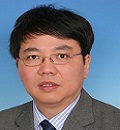Host
- Shanghai Jiao Tong University(SJTU)
- South China University of Technology (SCUT)
- Guangzhou Risong Intelligent Technology Holding Co.,Ltd
- Guangzhou Hi-Tech Industrial Development Zone
Organizers
- Robotics and Automation Committee of CWS
- Welding Process & Equipment Committee of CWS
- Automobile Committee of CWA
- Chinese Welding Society(CWS)
Co-organizers
- Chinese Mechanical Engineering Society (CMES)
- Chinese Welding Association (CWA)
- Guangdong Province Welding Society (GWSC)
- Guangzhou Welding Technology Institude
- SNOMACH Intelligence Technology Co.,Itd
- State Key Laboratory of AWJ(HIT)
- Shanghai Key Laboratory of MLPM(SJTU)
- to be confirmed
Plenary/Keynote Speakers

Prof. Han DING,
HUST/Academician, China
Topic
Future of Robotics: The Tri-Co (Coexisting-Cooperative-Cognitive) RobotsAbstract
Tri-Co Robots (Coexisting-Cooperative-Cognitive Robots) are those that can naturally interact and collaborate with the environment, including humans as well as other robots, and adapt to new situations. Coexistence will allow robots to ubiquitously and safely work alongside humans, considerably increasing our efficiency and quality of life. Cooperation will enable robots to collaborate and coordinate effectively with other agents through communication and interplay. Cognition will provide robots the resources to gather information, perceive and predict behaviors, and respond accordingly. This will all be achieved through state-of-the-art machine learning, control and planning algorithms. Key characteristics of Tri-Co Robots are: plastic and dexterity, multi-modal perception, and working autonomously and collaboratively. In particular, the development of rigid-flexible-soft robots and efficient solution methods are essential to achieve adaptation to environmental uncertainty and compliant interactions with humans and other robots.This talk will introduce the current research activities of robotics in China, especially the Tri-Robot Research Plan of NSFC (National Natural Science Foundation of China). It will discuss the primary scientific challenges and key scientific problems of the plan, mainly focusing on mechanism, perception and control. The talk will also forecast China’s expected breakthroughs and goals in Tri-Co robot research. 、Finally, the talk will present recent research results of our group and discuss current and future challenges.
Biography
Prof. Han Ding received his Ph.D. degree in Mechatronics from Huazhong University of Science & Technology in 1989. Supported by the Alexander von Humboldt Foundation, he worked at University of Stuttgart, Germany in 1993. He obtained the National Distinguished Youth Scientific Fund in 1997 and was awarded the “Cheung Kong” Chair Professor at Shanghai Jiao Tong University in 2001. He was elected a member of Chinese Academy of Sciences in 2013.Prof. Ding has long dedicated himself to research in the field of robotics and digital manufacturing, and has successfully combined both technologies. He published three academic books and more than 300 journal papers, and licensed more than 60 patents in China.
Prof. Ding is currently the dean of School of Mechanical Science & Engineering, and the director of the State Key Lab of Digital Manufacturing Equipment and Technology, which was evaluated as ``excellent’’ in the national assessment. He is a scientific committee member of the NSFC Tri-Co Robot major research program.
Prof. Ding acted as an Associate Editor (2003-2007) and as an Editor (2011-) of IEEE Transactions on Automation Science and Engineering. He was also a Technical Editor of IEEE/ASME Trans. on Mechatronics from 2010 to 2014. Currently, he is a Senior Editor of IEEE Robotics and Automation Letters. As a General Co-Chair, he hosted the IEEE International Conference on Robotics and Automation held in Shanghai, China in 2011. He is also the Co-founder of the IEEE International Conference on Intelligent Robotics and Applications.
Who will attend
Note : Attendees are being added
Special guest
The guests are being added.
